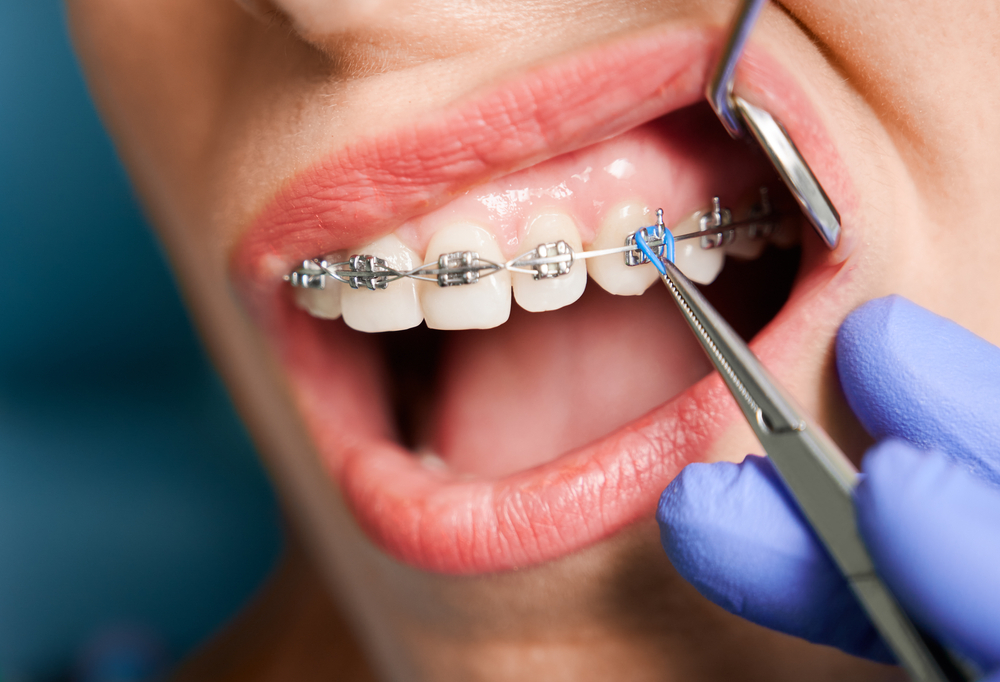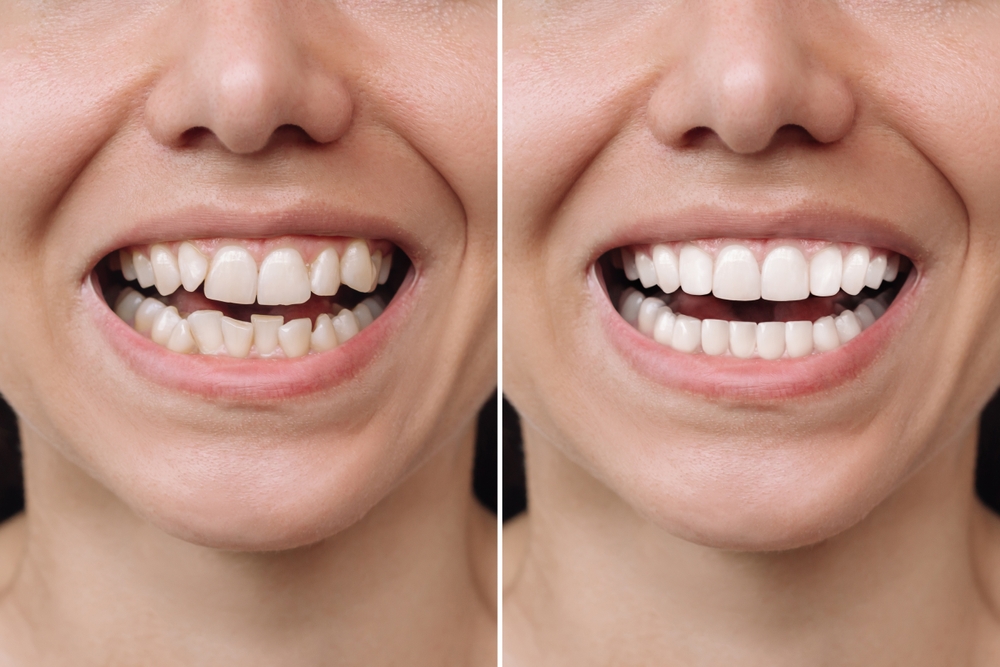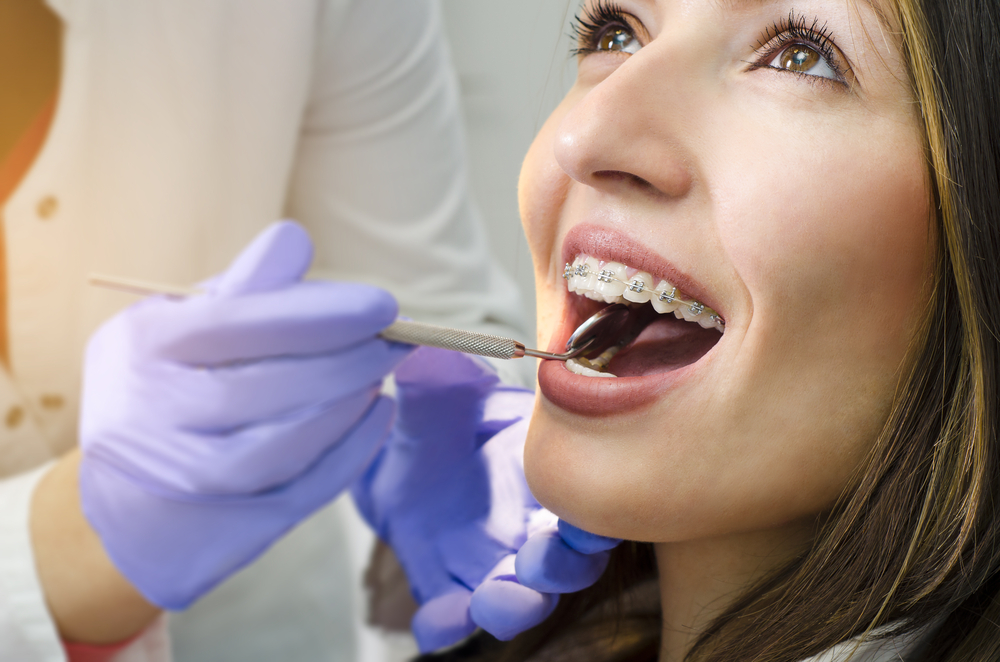Tired of seeing misaligned teeth every time you look in the mirror? As well as being a confidence killer, crooked teeth can lead to all manner of dental problems. Chewing can become an issue, while a misaligned smile can place excess strain on the jaw muscles, making throbbing headaches a daily occurrence. The good news is you don’t have to suffer any longer.
Ready to say farewell to crooked teeth for good? You’ll need a dentist in Cork that offers a full suite of orthodontic treatments. At Bandon Dental, our treatment options include traditional braces, clear aligners and retainers. Lets focus on braces for today.
How Do Braces Work?
While other treatment options like Invisalign have entered the market in recent years, braces remain the preferred choice of orthodontics for many people. Once fitted, braces apply constant pressure to the jaws and teeth, gradually shifting their position over time.
“Braces have brackets which are bonded to the teeth, with these brackets holding an archwire in position,” said Deirdre Dunne, a dental hygienist. “It’s this archwire that exerts pressure on the teeth themselves. Gradually, teeth are shifted, correcting issues like overcrowding and overbites.”
Types of Braces

Nowadays, patients have plenty of options when it comes to managing misaligned teeth and fixing a crooked smile.
Metal Braces
Metal braces are made up of wires and brackets, which are then directly attached to the teeth themselves. During treatment, metal braces are systematically adjusted by a dentist, allowing teeth to be shifted into the desired position.
Some metal braces even feature archwires that are activated by body heat, resulting in less discomfort for the patient and quicker results. While they’re not the most aesthetically pleasing choice, metal braces remain one of the most affordable and effective treatment options around.
Self-Ligating Braces
If you’re looking for a more discreet alternative to metal braces, self-ligating braces are something to consider. Although they look similar to metal braces, self-ligating orthodontics use clips to hold wires in place. Because of this, they tend to be more comfortable and practical for patients. While they can produce better alignment, self-ligating braces come at a premium.
Ceramic Braces
Ceramic braces are similar in appearance to metal braces. However, as they’re made from a ceramic material, they tend to be less obvious than their metal counterparts. Despite being more discreet, ceramic braces can be just as effective as metal ones. The downside here is that they’re typically more expensive. Proper cleaning and care are required to prevent the ceramic material from staining.
Do Braces Hurt?
Most people report minor discomfort after being fitted with braces. This is perfectly natural and nothing to be alarmed about. Over time, wearers will become used to the presence of brackets and wires in their mouths.
Discomfort is a normal part of the teeth realignment process. Any sensation you’re feeling is simply a result of changes to the periodontal membrane and jawbone. The most notable discomfort occurs after having your braces fitted for the first time, or after having them tightened at a follow-up appointment. However, toothache and tenderness tend to dissipate after a few days.
How Long Does It Take To Get Braces On?
Most braces are fitted within 1–2-hour appointments. “First, a dental hygienist will ensure your teeth are scaled and polished and a detailed oral hygiene instructions given,” Deirdre Dunne commented. “Oral hygiene is especially important while you are wearing braces. Then, your dentist will apply a bonding agent to attach brackets to the surface of your teeth.”
Once brackets have been applied, archwires and elastic bands are attached. Tightening braces is relatively straightforward. In most cases, adjustment appointments can be completed within 20-30 minutes.
How Long Do Braces Stay On?

This depends on a few factors. The patient’s age, the complexity of their dental problem and the type of braces being fitted all play a part. For adults, treatment time tends to be longer… but don’t worry! According to the British Orthodontic Society, 76% of British orthodontists have seen a rise in adults seeking orthodontic treatment, and the number is growing.
Treatment time for adults with braces is longer because teeth have usually been in place for many years and more effort is required to move them into the desired position. With children, the jaw is still growing, and teeth are still moving, meaning it’s easier to shift them into a new alignment.
When speaking with Mihailo Aleksich from Qunomedical, they stated;
Braces can typically remain on teenagers for an average duration of 18 to 24 months. However, the precise time may vary depending on individual cases and the complexity of the dental correction required. It’s crucial for teenagers to follow their orthodontist’s guidance to achieve the best results.
For simple cases like a minor spacing issue or a single crooked tooth, patients may only need to wear braces for a few months. However, more complex dental issues can take anywhere from 2-3 years to resolve with braces.
Metal and ceramic braces tend to produce faster results as they exert more pressure on the teeth. Although lingual braces are the preferred choice for self-conscious patients, achieving desired results takes longer. Lingual braces also tend to require more adjustment appointments.
What Can’t You Eat With Braces?
Your dietary choices can also impact the effectiveness of orthodontic treatment. After your braces are first fitted, your dentist will probably advise you to stick to soft foods that are easier to chew. Soups, soft cheeses, and scrambled eggs are an excellent choice here. As well as protecting your braces, softer foods will help with any sensitivity you’re experiencing.
You also need to make long-term dietary changes during your treatment. Some foods can damage wires and bands, leading to brace brackets detaching from the tooth. Anything crunchy or adhesive should be avoided. This means thinking twice before tucking into things like popcorn, boiled sweets and chewing gum.
Your oral hygiene will also need a rethink while you’re wearing braces. Even if you’re someone who brushes their teeth regularly, fitted braces make it easier for bacteria to take hold and plaque to form. To combat the risk of tooth decay, you’ll want to avoid sugary foods and beverages that will allow bacteria to thrive. Hygiene visits are very important throughout your orthodontic treatment as well as regular checkups with your general dentist.
We spoke with specialists at Pure Orthodontics and here is what they had to say:
First and foremost, sticky and chewy foods should be avoided. This includes chewing gum, caramel, and jellies. These foods can easily get stuck between brackets and wires, making them difficult to remove with regular brushing or flossing.
Hard and crunchy foods should also be avoided as they can potentially break or loosen your braces. Examples include hardboiled sweets, nuts, ice cubes, and pretzels. Instead of biting into these items directly with your front teeth, try cutting them into smaller pieces before consuming them.
Acidic foods and beverages should be consumed in moderation as they can contribute to enamel erosion over time. Citrus fruits like oranges and lemons, sodas, sports drinks, and acidic juices fall into this category.
By avoiding these types of food, you will help protect both your braces and your overall oral health. It’s always a good idea to consult with our specialist orthodontist for specific dietary guidelines based on your individual case. This way, you can ensure that you’re taking all necessary steps towards achieving a healthy smile!
Interested in Braces in Cork?
If misaligned and misshapen teeth are killing your confidence and making everyday activities a challenge, it’s time to consider braces. Looking for a dentist in Bandon that offers a full range of orthodontic treatments for adults and children? You’ve come to the right place.
At Bandon Dental, our team provides a full selection of preventive and restorative solutions. Thinking about cosmetic dentistry? Speak to us about teeth whitening, crowns and bridgework.
Ready to make an appointment? Get in touch with the team today via the online contact form. Alternatively, give us a call at (023) 884 1752 to book a consultation.

